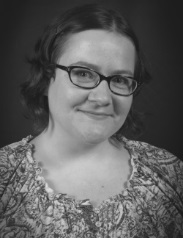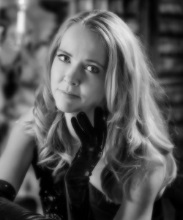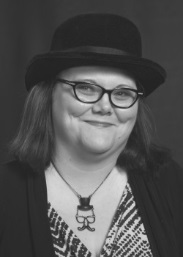Twisting Topeka (26 page)
Authors: Lissa Staley
Tags: #what if, #alternate history, #community, #kansas, #speculative, #library, #twist, #collaborative, #topeka

I don’t do other
things - like watch TV. I don’t use a cell phone, so I’m not
constantly looking at that or being interrupted by others. The
absence of both those activities gives me a Great Deal of time! I
do not write on a schedule. I write when the words come – even if I
have to pull them out of the air. It’s about focus and what
other things/activities you give up. It’s about what is
important.
Miranda Ericsson
Kendall
The Printed
Word

Miranda Ericsson
Kendall
has been building her personal
library since she was a little girl. She’s worked for the Topeka
& Shawnee County Public Library for five years, and leading
programs that engage and support writers in her community is one of
her favorite parts of the job. She majored in creative writing at
Washburn University in Topeka, and her work has been published
in
Inscape,
Argo
,
Homewords
,
XYZ
and
TK
Business
magazines, as well as in two
prior Community Novel Projects. She hopes that someday you’ll read
her work—whether you like to swipe a screen or turn a
page.
Why did you want to
participate in the Community Novel Project?
Participating as a project
leader is an amazing experience, and I am happy working behind the
scenes to support writers and help facilitate a successful project.
It was hard to make the personal time to write for this project
among other priorities, and I still don’t feel done with my
revisions--but I’m so glad that I did it. Once again I’ve been
reminded that if I want to be a writer, I have to prioritize
writing. And if I really want to write, I can make it
happen!
What was the inspiration
for writing your story?
A couple of years ago I saw
an article that speculated the eventual downfall of print books in
favor of eBooks. I was already reading eBooks by that time, and I
was surprised that I liked them. Being a fan of speculative
fiction, though, I have a healthy distrust of technology
dependence, and I imagined a scenario where everything was
digitized, and then lost, completely. I wrote down this sentence in
my notebook: “Ark of books—a librarian fills her house with books
so that she can share them after the fall.” When the collaborating
writers of this year’s Community Novel Project chose speculative
fiction or alternative history set in Topeka, I had the perfect
opportunity to work with the idea. I’ve read up on library trends,
so I know that digital libraries are on the rise. And sadly,
funding shortages in the state of Kansas are very real, so it
wasn’t hard to imagine a scenario where the library reduces the
budget by eliminating print—though I feel confident that our
community loves print books enough that the Topeka & Shawnee
County Public Library will never go completely bookless!
What is your writing
background? What do you usually write?
I see myself as a poet,
primarily, because when I sit down to explore an idea, it usually
forms into a poem on the page. I love writing short fiction, too,
and I journal or at least jot down ideas and thoughts every day. I
consider myself blessed beyond belief to be able to work with and
support writers in my community as part of my job at the Topeka
& Shawnee County Public Library, and I’m super proud that I’ve
completed two novels through NaNoWriMo programming at the library.
Someday I might even revise them and submit them for publication—or
publish them myself!
What’s the most important
writing advice you’ve received? What writing advice would you share
with other writers?
Poet Laureate of Kansas
Eric McHenry said in a talk at the library a few years back that
when writers submit work for publication, they’re “always up
against what the editor had for breakfast.” He reminded us that
judging creative writing is absolutely subjective, and many fine
writers are rejected for publication every day. His advice:
“persist and believe.” On the same note, Sylvia Plath wrote: “The
worst enemy to creativity is self-doubt.” These are two poets who
know what they’re talking about. If you want to be a writer, you’ll
have days when you feel like you can do nothing but track mud
across the page. You’ll have to be able to keep writing anyway, and
persist, knowing that you have something valuable to share. Your
words count! Write them down and share them with the
world.
C R Kennedy
Cleansing
Waters

C R Kennedy
is a graduate of Kansas State University where
she majored in finance and accounting. Her passion for creativity
and the Hollywood silver screen sparked her career drive to write
vintage and modern-day romance, suspense, espionage and mystery
stories. She is a member of Kansas Writers Inc. and Phantom Gavel
Publishing. C R has several works in progress and available fiction
can be found at crkennedyink.com. She also recently launched a fun
and fresh blog about mid-century modern culture at
AVintageChick.com.
Why did you want to
participate in the Community Novel Project?
I love the idea of a local
group of writers collaborating on a project that revolves around
their community. Brainstorming together, critiquing each other,
supporting each other…it’s fun and makes us all better at our
craft.
What was the inspiration
for writing your story?
I don’t make it a secret
that I’m a huge fan of old Hollywood. Since I’ve lived in Topeka
I’ve often heard about celebrities and movie stars spending time at
Menninger’s Hospital. I thought it would be fun to blend those two
ideas and toss an innocent young girl into the mix.
What is your writing
background? What do you usually write?
I enjoyed writing in high
school and college but never considered it as a career choice.
About seven years ago I started playing with a story idea. Since
then I have written many stories, poems, and nonfiction pieces. I
enjoy suspense, romance, espionage, and mysteries in fiction. I
also write a blog about mid-century modern culture.
What’s the most important
writing advice you’ve received? What writing advice would you share
with other writers?
Don’t give up if you’re
passionate about writing and believe it is your chosen path. My
very first writer’s workshop session was on a Saturday afternoon. I
thought my submission was wonderful, but the group ripped it apart.
I took it personally and considered giving up on my story. The next
morning my priest gave a homily about never giving up. I took it as
a sign, kept writing, and have never contemplated giving up
since.
How do you make time for
writing?
My days are sometimes
random and chaotic, so I write whenever I can. But I’ve also
learned not to force creativity. I find something else
constructive, like cleaning the house or gardening, to do until the
creative juices start to flow.
Diana Marsh
What Fate
Ordains

Diana Marsh
grew up wanting to be an astronaut, until the
Space Shuttle Challenger tragedy and the realization of how much
math is required to be an astronaut shot that plan to bits. Instead
of going to the moon, she writes fiction predominantly set in the
late 1800s – with an urban fantasy plot stealing her attention here
and there – and blogs about Sherlock Holmes. This is her
5
th
year participating in the Community Novel Project, having
previously contributed chapters to
Capitol
City Capers, Speakeasy, Superimposed,
and
Time Harbor
.
Why did you want to
participate in the Community Novel Project?
This is my fifth year
contributing to the Project, and the reasons I keep coming back are
the wonderful people I get to work with and the challenge that
comes with collaborating with other writers. The Topeka writing
community is lucky to have a library that is so supportive of its
efforts and is willing to provide them opportunities like the
Community Novel to showcase their work, learn more about their
craft and the business of it, and add something interesting to
their list of credits.
What was the inspiration
for writing your story?
The inspiration for “What
Fate Ordains” is two-fold, technically. I am a big fan of
pod-fiction – podcasts that specialize in audio drama, like
“Wormwood,” “We’re Alive,” and “The Message.” I am a sucker for a
good audio drama. There is a podcast called “The Truth” that
dramatizes short fiction, and their pilot episode was a story
called “Moon Graffiti,” inspired by the speech prepared for Richard
Nixon in the event that Apollo 11 ended in tragedy. Their story
explored the crash from the point of view of Neil Armstrong and
Buzz Aldrin, stuck on the moon until their oxygen ran out. I’d
never heard of the existence of this speech before – proof that
maybe I live under a rock or something – and was compelled to look
it up after I’d listened to the episode. The speech, and the
story, poked around in my brain until the theme of this year’s
Community Novel finally gave me an opportunity to play around with
my take on the idea.
What is your writing
background? What do you usually write?
I am primarily a mystery
writer. Even when I try to write urban fantasy or romance, it ends
up being mystery. The last few years, I’ve leaned heavily towards
Victorian Era fiction - I’m currently working on a series of
Sherlock Holmes pastiches featuring a female Holmes as well as a
steampunk/alternate history novel set predominantly in 1880s
Kansas. I’ve also written urban fantasy and dipped my toes in the
romantic comedy end of the pool.
What’s the most important
writing advice you’ve received? What writing advice would you share
with other writers?
I took a creative writing
course in college where one of our textbooks was
Bird by Bird
, by Anne
Lamott, and the most memorable piece of advice I took away from
that book was that it’s okay to write terrible first drafts –
that’s not the direct quote, but I’m keeping it clean here. I
didn’t really take that advice to heart, though, until much later,
when I discovered National Novel Writing Month. It’s impossible to
play perfectionist when you only have 30 days to try to crank out
50,000 words. You pretty much have to allow yourself to write
garbage, with the understanding that coming back to fix it is the
job you undertake after you’ve finished the thing.